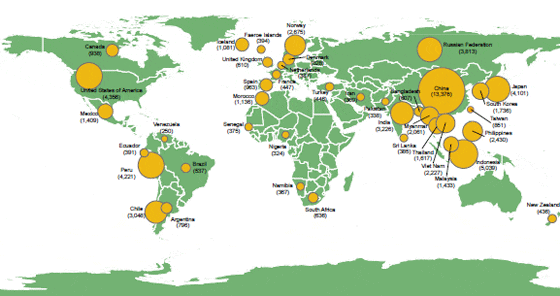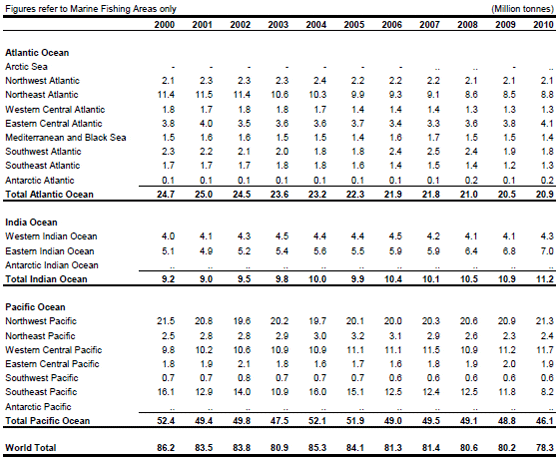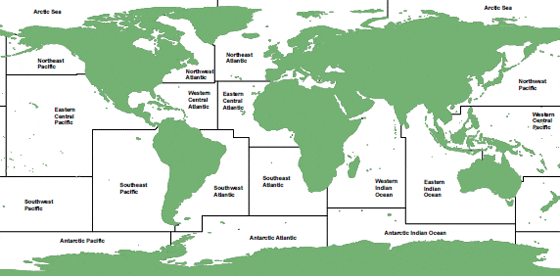Introduction
The world catch data presented in this chapter have been extracted from the most recently available data from the Food and Agricultural Organisation (FAO) of the United Nations. These tables present annual statistics from 2000 to 2010, on a world-wide basis, of nominal catches (see Appendix 1, Glossary of terms). The data are official statistics and are not subject to National Statistics accreditation. The FAO updates historic data frequently. Revisions have not been highlighted in the following tables.
World Catch
In 2010, the world catch figure from marine fishing was around 78 million tonnes, down 2 per cent compared with 2009. Table 6.1 shows vessels from Asia and the Middle East catching 53 per cent of the world total with European vessels catching 17 per cent. Central and South America vessels accounted for 15 per cent of world total; this is a reduced share because their catch fell by 24 per cent in 2010.
World Catch by Continent: 2000 to 2010

Source: FAO
(a) Central & S.America includes the Caribbean.
(b) Asia includes the Middle East.
(c) Not elsewhere included.
Chart 6.1 shows the total catch by major fishing nations in terms of quantity caught in 2010.
In 2010, China (including Hong Kong and Macao SAR) caught the largest amount of fish, 13.5
million tonnes. Indonesia had the second largest catch at 5 million tonnes. The United States of
America, Peru and Japan each caught between 4 and 5 million tonnes.
In 2010, Spain caught 963 thousand tonnes, the highest of any country in the European Union.
Denmark caught 828 thousand tonnes. FAO figures show a UK catch in 2010 of 618 thousand
tonnes (including 8 thousand tonnes by the Isle of Man and Channel Islands). It should be noted
that this is different from the figure of 608 thousand tonnes shown in Table 3.6 of Chapter 3.
World Catch by Nationality of Vessel, Major Catchers of Fish: 2010 ('000 tonnes)

FAO fishing areas are shown in Chart 6.2. Of the 78 million tonnes of fish caught in 2010, 59 per
cent were caught in the Pacific Ocean, 27 per cent in the Atlantic Ocean and 14 per cent in the
Indian Ocean (see Table 6.2).
In the Atlantic Ocean, the 2010 catch was 15 per cent lower than in 2000 and the catch in the
Pacific Ocean was down by 12 per cent over the same period. However, in the Indian Ocean,
marine catches have increased by 23 per cent between 2000 and 2010. This is almost entirely due
to the 36 per cent increase in catches from the Eastern Indian Ocean.
World Catch by Sea Area: 2000 to 2010

Source: FAO
Note: The data in this table are official statistics and not subject to National Statistics accreditation.
115
FAO Marine Fishing Areas

Source: VLIZ (2005). FAO Fishing Areas Geodatabase.
November 2012



